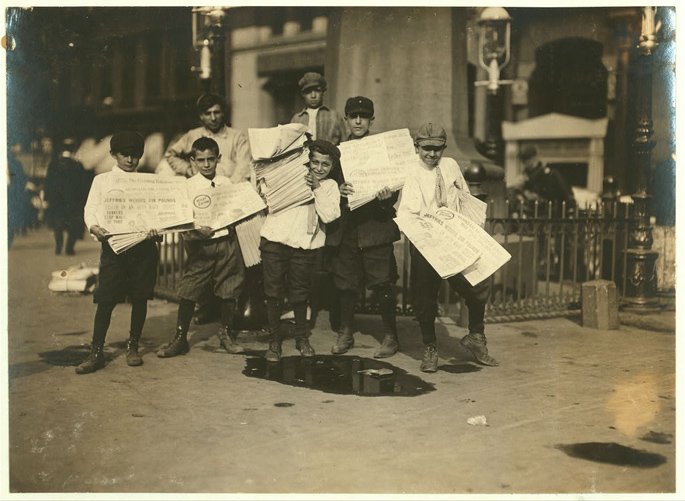After the U.S. elections we're going to look at the performance of American media over the last decade but before we get to that, some (literally) sepia-toned history.
From The Paris Review:

Newsboys and newsgirls on Newspaper Row, Park Row, NYC. Photo by Lewis Wicks Hine from Library of Congress
The reporters would pant up five flights of stairs to reach their dingy, dim newsrooms, where light eked through the dirt-cloaked windows and the green shades over the oil lamps were burned through with holes. They wended through hobbled tables piled high with papers, walked past cubbies so chaotically stuffed with scrolled proofs no outsider could guess the system. The reporters reeked of five-alarm smoke, or had coat pockets bulky with notes and a pistol from the front, or were tipsy from a gala ball, or dusty from a horse race. If they held important news in those notebooks, a copy boy would crowd by their elbow as they wrote, snatch the ink-wet sheets from their hands, and rush them off to the copyholder to “put them into metal.”
The center of news in the nineteenth century lined the streets around City Hall Park, only a short sprint to Wall Street, close to the harbor. News sailed in on the wind. Newspaper schooners cut through the waves and fog to land their men onboard the arriving European steamers before the less affluent New York newspapers could get out there with their rowboats.
Amid recent renovations on Park Row, construction workers discovered artifacts of news reporters inside the walls—papers and typewriters. Who knows what ghosts might lurk there still?
“Journalism is the real Minotaur,” nineteenth-century reporter Stephen Fiske remarked, looking back on his career. “It demands every year a fresh supply of young men and women: devours them, destroys them, and is ready for another batch of tender victims from colleges or country towns.” He had begun as a columnist at age twelve. Other reporters jumped in audaciously in their twenties, such as Henry Villard, a German immigrant who rapidly taught himself English so as to cover the Lincoln–Douglas debates....
....MUCH MORE
HT: Arts & Letters Daily (also on blogroll at right)